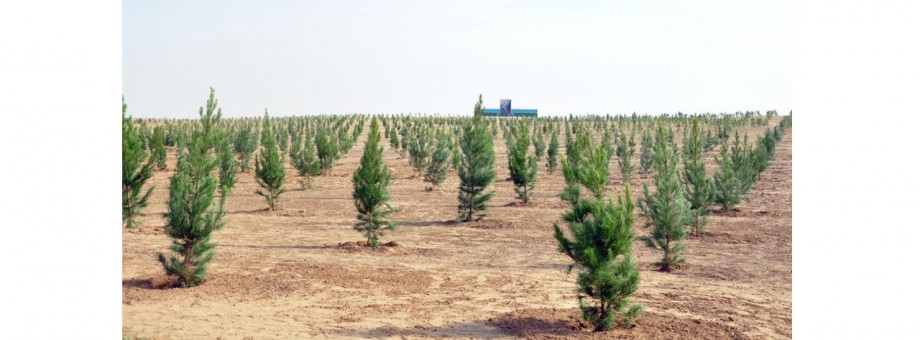FOR THE BENEFIT OF NATURE AND MAN

Turkmenistan has approved the National Forestry Program for 2021–2025 and the Action Plan for its implementation. Being closely linked with the implementation of the tasks of the National Strategy of Turkmenistan on Climate Change, the document provides for the planting of deciduous, coniferous and fruit trees, grape seedlings and desert plants, based on the characteristics of natural ecosystems and soil and climatic conditions of the country. The National Forestry Program of Turkmenistan serves as the basis for plans for the preparation of regulatory legal acts and research work, organizational measures for the development of forestry in the country, as well as identifying key areas for the development of international cooperation in the forestry industry and its development based on the best world experience.
The implementation of the National Forest Program of Turkmenistan for 2021–2025 will be another practical step in the implementation of the country's comprehensive environmental and climate strategy, which includes a wide range of areas. These are international initiatives on the Aral Sea issues and the preservation of biodiversity and ecological balance in the Caspian Sea, measures implemented in the country to adapt to climate change and environmental protection, environmental monitoring and study of biodiversity in various ecosystems. Scientists of the country are engaged in research and development of recommendations for the restoration and improvement of degraded grasslands, protection of roads, railways, and other economic facilities from sand drifts. Scientific foundations are being created for the development of a network of specially protected natural areas, a comprehensive study of the biodiversity of flora and fauna, the formation of a data bank and the State cadastre, monitoring of endemic, rare and endangered species of animals and plants, and the maintenance of the national Red Book.
All this organically fits into the global agenda and, in particular, the tasks of the Decade for Ecosystem Restoration for 2021-2030 announced by the United Nations. The Decade of Ecosystem Restoration is a global call to action for humanity and nature that will mobilize the necessary political, scientific and economic resources to combat global warming, environmental pollution and biodiversity loss. Ecosystems requiring urgent restoration include agricultural land, forests, grasslands and savannas, mountains, peatlands, freshwater, oceans, and urban ecosystems. The Decade for Ecosystem Restoration will be led by the United Nations Environment Program (UNEP) and the United Nations Food and Agriculture Organization (FAO).
The purpose of the UN Decade is to inspire and support governments, UN agencies, civil society, private sector companies, youth, women's groups, indigenous peoples, farmers, local communities and individuals around the world to collaborate, develop and stimulate initiatives everywhere for restoration. Efforts will be directed towards organizing many events. An important place in the complex of these measures is given to the protection and restoration of forests, which play a significant role in climate regulation.
In Central Asia, the entry into the UN Decade for Ecosystem Restoration presupposes, first of all, an increase and unification of efforts to transform the degraded lands and landscapes of the Aral Sea and the entire region into healthy ecosystems, improve the condition of agricultural land and increase the efficiency of land and water resources management in general.
Ogulgozel Rejepova


 NEWS
NEWS